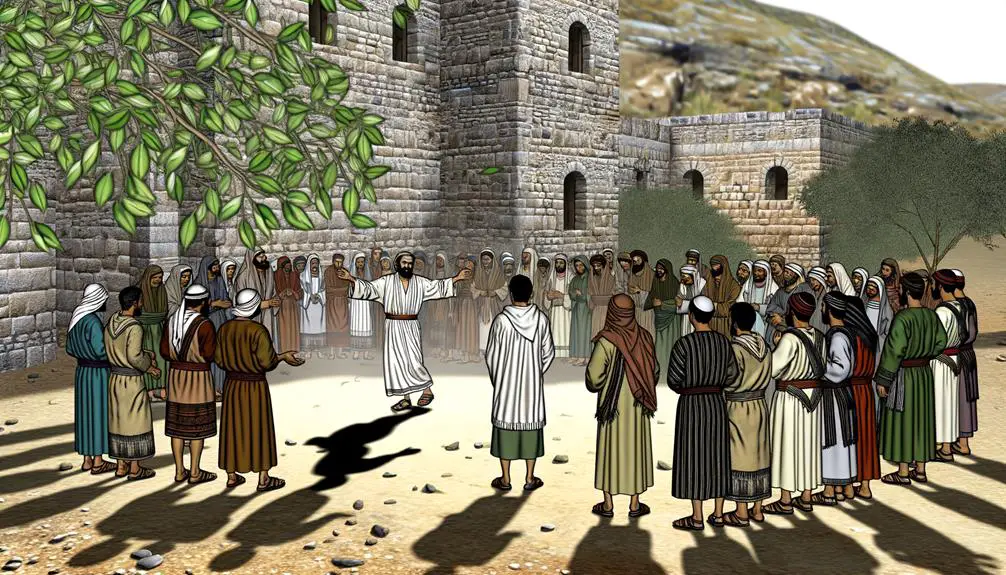Bridging ancient miracles and modern faith, "Ephphatha" in the Bible invites a journey of spiritual awakening and deeper understanding—discover its significance.

Ephata in the Bible
Have you ever stumbled upon a word so powerful, it unlocks a deeper understanding of faith itself? 'Ephphatha,' found in the heart of Mark's Gospel, is such a word.
As you explore its origins, linguistic nuances, and symbolic meanings, you're embarking on a journey through history and theology. This Aramaic command, meaning 'Be opened,' invites you not just to learn about a biblical miracle but to reflect on its implications for modern faith and practice.
The layers of interpretation awaiting your discovery promise to enrich your spiritual insight, urging you to consider the transformative power of understanding and applying Scripture in your life.
Key Takeaways
- "Ephphatha," an Aramaic term meaning "be opened," signifies spiritual and physical healing in biblical contexts.
- Understanding its pronunciation and cultural background enhances the depth of its scriptural significance.
- The term symbolizes a broader theme of awakening and divine intervention, inviting personal transformation.
- Accurate translations and contextual interpretations of "Ephphatha" are crucial for its relevance in modern spiritual and scholarly discussions.
The Origin of Ephphatha

In tracing the origins of 'Ephphatha,' we delve into a context deeply rooted in biblical narratives, specifically within the New Testament, where this Aramaic term signifies a profound command to 'be opened.' This phrase, standing out among mystical utterances, showcases the rich tapestry of Aramaic etymology, hinting at a broader cultural and spiritual significance. Aramaic, the vernacular of Jesus Christ and his disciples, serves as a bridge connecting the divine to the earthly, making 'Ephphatha' more than just a word; it's a conduit of divine action.
Analyzing 'Ephphatha' within its Aramaic etymology reveals layers of meaning that transcend a simple command. It embodies a spiritual awakening, an invitation to open one's heart and mind to the divine truth. This term's mystical nature is amplified by its sparing use, marking moments of profound spiritual significance. It's not merely about physical healing or the opening of ears; it's a symbolic act of opening oneself to the transformative power of faith.
The origin of 'Ephphatha' thus reflects a multifaceted concept. It's a linguistic testament to the power of words to bridge the human and the divine, to unlock deeper spiritual realities. In your journey through biblical texts, understanding 'Ephphatha' becomes crucial. It's not just about grasping its linguistic roots but appreciating its role in the tapestry of mystical utterances that have shaped spiritual narratives. Through 'Ephphatha,' you're invited to explore the intersection of language, faith, and spiritual awakening, where words aren't just symbols but vessels of divine truth.
Ephphatha in Mark's Gospel

Mark's Gospel presents 'Ephphatha' as a pivotal moment, underscoring its transformative power within the narrative of Jesus's miracles. This instance, nestled within the broader context of Mark's depiction of Jesus's ministry, highlights a singular moment of deaf-mute healing that stands as both literal and metaphorical. The miracle location, on the outskirts of the Decapolis, isn't merely a geographical detail but serves to emphasize the inclusivity of Jesus's mission, reaching out to marginalized communities and individuals.
The act of Jesus healing the deaf-mute man by uttering 'Ephphatha', which means 'Be opened', transcends the physical restoration of hearing and speech. It symbolizes the opening of spiritual understanding and the breaking down of barriers that separate humanity from the divine. This miracle, therefore, isn't just about the restoration of physical abilities but also about the initiation of the individual into a deeper, more profound level of communication and communion with the divine.
In Mark's Gospel, the recounting of this event is carefully positioned to amplify its significance. It serves as a testament to Jesus's authority over physical and spiritual maladies and as an invitation to the reader to experience a similar opening, a liberation from whatever binds or limits them. The setting, the action, and the command 'Ephphatha' converge to create a moment of profound revelation and transformation, underscoring the holistic nature of Jesus's ministry.
Analyzing 'Ephphatha' within Mark's Gospel thus offers insights into the thematic and theological underpinnings of Jesus's miracles, revealing a complex interplay between the physical and the spiritual, the individual and the communal, the human and the divine.
Linguistic Insights

You'll find that Ephphatha's original language offers a rich foundation for understanding its translation and interpretation.
Exploring its cultural and historical context sheds light on the nuanced meanings that transcend a simple word-for-word translation.
This approach not only enhances your comprehension but also connects you more deeply with the text's significance.
Ephata's Original Language
Understanding Ephphatha's origin requires delving into Aramaic, the language spoken by Jesus and prevalent in many biblical narratives. This exploration not only enriches your comprehension but also connects you deeply with the historical context of the term.
A pronunciation guide becomes indispensable here, as Aramaic sounds differ significantly from those in English. The correct articulation bridges centuries, allowing a more authentic engagement with the scriptures.
Scriptural occurrences, notably in the Gospels, offer a window into the moments where 'Ephphatha' was invoked, emphasizing its significance. These instances aren't merely anecdotal but are embedded within the fabric of the narrative, highlighting the power of speech and healing in biblical times.
Analyzing these facets sheds light on the term's profound implications.
Translation and Interpretation
How does the translation of 'Ephphatha' from Aramaic to other languages impact its interpretation and significance within biblical scholarship?
As you delve into the linguistic nuances, it's crucial to consider the role of pronunciation guides. These tools not only aid in understanding the original sound but also in grasping the intended meaning behind the words.
Moreover, contemporary applications of 'Ephphatha' hinge on accurate translations. Misinterpretations or overly literal translations can skew the phrase's rich theological and metaphorical layers.
Scholars argue that understanding the original context and intended audience is key to unlocking its full potential in modern discourse. Thus, the translation process isn't merely linguistic but deeply interpretative, shaping how 'Ephphatha' is understood and applied today.
Cultural and Historical Context
Exploring the cultural and historical context of 'Ephphatha' reveals its profound significance in ancient biblical societies, offering linguistic insights that enrich our interpretation today. Here's how:
- Ritual Practices: 'Ephphatha' was more than a word; it symbolized a divine intervention, deeply embedded in the ritualistic practices of healing and purification.
- Linguistic Nuances: The term carried layers of meaning, reflecting a society where spoken words were believed to hold power.
- Social Implications: By invoking 'Ephphatha', individuals weren't just seeking physical healing but also social reintegration, highlighting its role in breaking down barriers of isolation.
- Historical Layers: Understanding 'Ephphatha' within its original context sheds light on the dynamic interplay between language, faith, and society in ancient times, offering a nuanced perspective on its application and significance.
Symbolic Interpretations

Often, the term 'Ephata' serves as a profound symbol in biblical literature, inviting readers to delve deeper into its layered meanings and implications. This term, rooted in moments of miraculous healings, transcends its literal context to embody broader themes of personal transformation and spiritual awakening. When you explore 'Ephata' within the tapestry of biblical narratives, you're not just encountering a historical account of physical restoration; you're engaging with a metaphorical invitation to open oneself to the transformative power of faith and divine intervention.
'Ephata,' in its essence, prompts an introspective journey, urging you to reflect on the areas of your life that may be metaphorically 'deaf' or 'mute' to the voice of truth, compassion, or understanding. It's not merely about the physical act of healing but symbolizes a deeper, spiritual healing that fosters a profound personal transformation. This transformation isn't instantaneous but a gradual awakening, akin to the slow opening of eyes that have been long closed to the light.
In this light, 'Ephata' becomes a pivotal moment of revelation, where the barriers to spiritual and emotional growth are removed, allowing for a reconnection with the divine and with the essence of one's being. It's a call to action, challenging you to actively engage in your personal journey of faith, healing, and transformation.
Thus, 'Ephata' holds a multifaceted significance, symbolizing not just miraculous healings but serving as a beacon that guides individuals towards a path of personal and spiritual renewal. In the pursuit of understanding 'Ephata,' you're invited to explore the depths of your faith, to listen actively, and to open your heart to the possibilities of profound change and enlightenment.
Historical Context

To understand 'Ephata' fully, it's crucial to delve into its historical context within the biblical narrative. This exploration not only enriches your comprehension of the term but also situates it within a broader spectrum of religious and cultural practices of the time. Here's what you need to consider:
- Geographical Significance: The locations mentioned alongside 'Ephata' in the scriptures weren't chosen arbitrarily. Each site had strategic, religious, or economic importance that influenced the events described. Understanding these places' roles in the ancient world provides insight into the narrative's setting and characters' actions.
- Cultural Practices: The cultural context during the period 'Ephata' was documented plays a pivotal role. This includes social norms, religious rituals, and linguistic nuances that would have shaped the interpretation and significance of 'Ephata' to its original audience.
- Archaeological Evidence: Excavations and findings offer tangible links to the past, shedding light on the historical accuracy of the biblical accounts associated with 'Ephata'. Artifacts, inscriptions, and architectural remnants serve as crucial pieces of the puzzle, helping to corroborate or challenge traditional interpretations.
- Historical Events: Key events that occurred around the time 'Ephata' was referenced can provide a backdrop against which its importance and usage can be better understood. Political upheavals, migrations, and natural disasters, for instance, could have directly or indirectly influenced the narrative.
Theological Implications

You must consider Ephata's invocation as a testament to divine authority, illustrating a direct channel of communication and command from the divine realm to humanity.
This event isn't merely a miracle; it's a pivotal moment signifying spiritual awakening, highlighting the transformative power of faith and divine intervention.
Ephata's Divine Authority
Exploring Ephata's divine authority reveals its profound theological implications, particularly in how it underscores the power of divine intervention in human affairs. This concept is deeply rooted in the biblical narrative and provides a rich field for analysis, focusing on:
- Miracle Demonstration: Ephata acts as a vivid demonstration of divine power, transcending the natural order.
- Authority Manifestation: It symbolizes the ultimate authority of the divine over physical and spiritual realms.
- Faith Reinforcement: Ephata encourages believers to trust in divine will and capabilities.
- Divine-Human Relationship: It highlights the interactive relationship between the divine and humanity, where divine commands lead to transformative outcomes.
Through these lenses, you'll appreciate the complexity of divine authority as illustrated by Ephata, offering insights into its significance within theological discourse.
Spiritual Awakening Significance
In examining the theological implications of Ephata, it becomes evident that this concept serves as a catalyst for spiritual awakening, fundamentally altering one's perception of divinity and self. Through the narrative of healing miracles, Ephata underscores a profound personal transformation.
This transformative power isn't merely about physical healing, but it delves deeper, fostering a reawakening of the soul towards a heightened spiritual realm. You're invited to perceive these miracles not as isolated events but as symbolic gestures that open the human heart to divine truths.
The act of saying 'Ephata' transcends its historical context, becoming a timeless call to break free from spiritual deafness and blindness, thus enabling a fuller, more authentic communion with the divine and oneself.
Modern Relevance

Despite its ancient origins, the concept of 'Ephata' remains deeply relevant in today's societal and spiritual contexts. Its call to 'be opened' transcends mere historical curiosity, embedding itself into the fabric of modern life through various applications and significant societal impacts. The essence of Ephata challenges you to open your mind and heart to new perspectives, fostering a culture of understanding and empathy in an increasingly polarized world.
Here are four key ways Ephata's message reverberates today:
- Promoting Inclusivity: Ephata encourages communities to dismantle barriers, both physical and metaphorical, that prevent individuals from fully participating in society. This ethos supports efforts towards inclusivity for people with disabilities, advocating for environments that are accessible and welcoming to all.
- Enhancing Communication: In a digital age where misunderstandings are rampant, Ephata's call to openness is a reminder of the importance of clear, compassionate communication. It inspires efforts to bridge gaps between differing viewpoints, facilitating dialogue and mutual respect.
- Fostering Spiritual Growth: Ephata remains a cornerstone in spiritual practices, urging individuals to open themselves to divine wisdom and guidance. This openness is crucial for personal development and a deeper understanding of one's place in the universe.
- Encouraging Emotional Vulnerability: In a society that often prizes stoicism, Ephata challenges the stigma around vulnerability, advocating for a culture where expressing emotions and seeking help are seen as strengths rather than weaknesses.
Through these modern applications, Ephata's ancient call to 'be opened' continues to have a profound societal impact, proving that its message isn't only timeless but also universally applicable.
Reflective Practices

Building on Ephata's modern relevance, we now examine how its principles can enrich reflective practices, enhancing personal growth and self-awareness. Ephata, a concept deeply rooted in transformation and opening oneself to divine insight, offers a profound framework for engaging with texts and experiences in a way that fosters deeper understanding and connection.
Mindful reading, an approach that embodies the essence of Ephata, invites you to engage with texts, whether sacred or secular, in a manner that transcends mere intellectual comprehension. It's about allowing the words to resonate within, to speak to your experiences, challenges, and aspirations. This practice encourages a pause, a moment of stillness, where the text's deeper meanings can unfold and reveal insights that are personally significant.
Prayerful reflection, another facet of Ephata's influence on reflective practices, integrates spirituality into the process of self-examination. It's not merely about seeking answers but about opening your heart and mind to receive guidance, comfort, or even challenges. This form of reflection acknowledges the presence of a higher power in the journey of personal growth, creating a space where transformation can occur in the context of faith and surrender.
Incorporating these practices into your daily routine can significantly impact your personal development and spiritual journey. They offer a pathway to greater self-awareness, empathy, and resilience, grounded in the wisdom that Ephata embodies. As you continue to explore and integrate these reflective practices, you'll likely find that they not only enrich your understanding of yourself and your place in the world but also deepen your connection to the divine.
Frequently Asked Questions
How Has the Interpretation of "Ephphatha" Varied Across Different Christian Denominations?
You'll find that interpretations of 'ephphatha' vary widely across Christian denominations, deeply influenced by linguistic origins and the cultural impact of the term.
Scholars and theologians analyze its usage, considering historical context and evolving language, leading to diverse theological implications. This variance reflects the rich tapestry of Christian thought, where linguistic nuances and cultural contexts shape understanding, making the exploration of 'ephphatha' a fascinating study within denominational beliefs.
Are There Any Specific Rituals or Ceremonies in Contemporary Christian Churches That Directly Invoke the Word "Ephphatha"?
You're exploring whether modern Christian churches use 'ephphatha' in rituals or ceremonies. This term's symbolism and its modern adaptations vary.
Some denominations incorporate 'ephphatha' into baptismal rites, symbolizing spiritual awakening and hearing God's word. Others might use it during healing services, echoing its biblical roots in miraculous healing.
However, its application isn't universal, reflecting diverse interpretations and practices within Christianity. This exploration reveals the evolving nature of religious rituals and their meanings.
Has "Ephphatha" Been Referenced or Utilized in Major Christian Theological Debates or Controversies?
In the heart of theological debates, the term 'Ephphatha' has sparked more fires than a lightning strike in a dry forest. Scholars have dissected its linguistic origins, considering its implications on healing methodologies within Christian thought.
This scrutiny hasn't only shed light on historical practices but also ignited controversies over the interpretation of sacred texts. Analyzing its role offers a deeper understanding of its impact on contemporary theological discussions.
Can the Concept of "Ephphatha" Be Found in Any Non-Canonical Texts or Apocryphal Gospels?
You're delving into whether the concept of 'ephphatha' appears in non-canonical texts or the apocryphal gospels.
It's crucial to explore Gnostic interpretations and textual origins for insights. Scholars analyze these texts for echoes of 'ephphatha,' drawing connections between canonical and non-canonical works.
This analysis often reveals how early Christian communities understood and adapted such concepts, providing a broader context for 'ephphatha' beyond its biblical roots.
How Do Other Major World Religions or Philosophical Traditions Interpret or Make Use of the Concept Embodied by "Ephphatha"?
You'll find that major world religions and philosophical traditions often echo the essence of opening up, akin to 'ephphatha,' but in their unique contexts.
In Buddhism, the practice of silence opens the door to profound inner peace and enlightenment, mirroring the transformative power of 'ephphatha.'
Similarly, Sufi traditions emphasize deep listening as a path to divine understanding, suggesting a spiritual awakening through attuning oneself to the divine, paralleling the 'ephphatha' concept.
Conclusion
In conclusion, you've journeyed through the layers of 'Ephphatha,' uncovering its origins, linguistic nuances, and deep symbolic meanings. It's a beacon in Mark's Gospel, not just a mere word but a profound invitation to openness and understanding.
Like a key unlocking a door, Ephphatha bridges the gap between the divine and the human, urging modern believers to listen deeply and act with compassion. Its relevance transcends time, echoing the call for spiritual awakening in our contemporary world.



Sign up